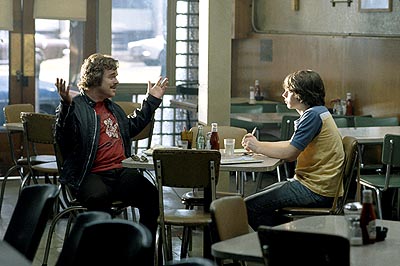David Lee Roth once said something to the effect of “All Rock critics like Elvis Costello because they all look like Elvis Costello” which perfectly summarizes the conflict between just about every great Rock Star and their adoring fans. Bands almost always give you the choice between the sexy good time entertainer up front and the awkward bent genius standing in the back corner. Think Mike Love vs. Brian Wilson and Roth with his endless battles with the shy Eddie Van Halen, but most of all it comes down to big nosed, acned Pete Townshend slipping his words of uncertainty, hope and angst into the mouth of “Golden God” Roger Daltrey, who merely wanted to put on a few good shows. Cameron Crowe’s Almost Famous understands the exact dynamic of all the smart awkward kids who wish they were as smooth as Elvis Presley.
When I was in high school, I thought there could be nothing cooler than pretending to be Pete Townshend giving an interview in which he would tell all his enraptured listeners how he jumped from a shy, impassioned wallflower to some kind of Rock and Roll poet guitar slinger, but in truth that initial identity that you get branded with in high school never really ever goes far away from your subconscious. Perhaps no film has ever grasped that better than this one. Philip Seymour Hoffman as legendary Rock critic Lester Bangs embodies every bit of this ironic trauma. I mean it’s almost taken as fact that you have to describe him as legendary Rock critic Lester Bangs, but what a wild notion that there could ever be such a thing. He was loud, sloppy, drunk, and almost proudly cantankerous. Crowe catches a great feel for the guy when he starts posturing about how Jim Morrison wasn’t really a poet he was a drunken buffoon, and then in the next second talks about how he loves the Guess Who because they are truly such drunken buffoons that it becomes almost poetic.
Hoffman tells Crowe stand-in Patrick Fugit what we all so desperately want to believe. That the true art doesn’t come from the cool guys who get all the woman, but from the misfits who watch from the sidelines and express their aching longing to be one of those beautiful smooth talking morons only every bit as sensitive as they ever wished themselves to be.
Almost Famous is filled with characters, who desperately cling to their love for what they know are wretchedly silly pop songs, but it was the art they first fell in love with and it means everything to them. When Zooey Dechanel, as Fugit’s sister leaves home, she leaves behind her record collection with the promise that it will set her brother free. That was the initial premise the first time Buddy Holly saw Elvis Presley, it was the reason the Clash formed after seeing the Sex Pistols, and it remains the same reason confused kids across the country who didn’t know the first thing about what they wanted to do with their lives would beam when someone would show them how easy it was to learn how to play all of “Smells Like Teen Spirit” on a beat up cheap used acoustic guitar.
It’s odd that Almost Famous comes out so close to the simultaneous release of albums by Barenaked Ladies, The Presidents of the United States of America, and Harvey Danger. I dare you to name three more dorky bands on the planet yet every one of those guys still feel that they can say something meaningful, decent, and heart rendering with the simplicity of a child’s toy. Duke Ellington, Miles Davis, Charlie Parker, and John Coltrane is where everyone winds up when they get more ambitious, but nothing ever really touches you like the first time you heard “Wooly Bully” and smiled like an idiot for the rest of the day. Roy Orbison, Joe Jackson, Johnny Rotten, Marshall Crenshaw, Ray Davies, Bob Dylan. Everybody deserves the chance to be serenaded by the one they love, and everyone deserves the brief glare of spotlight that comes when someone desperately wants to know your opinion and your dreams. It’s not entirely what Almost Famous is all about, but it conveys it better than any movie ever filmed. I always thought John Lennon’s decision to finally start wearing his glasses in public was heroic. He had accomplished everything his anger and passion ached to achieve and in the end decided that he was better off as the awkward whelp he started off as.

